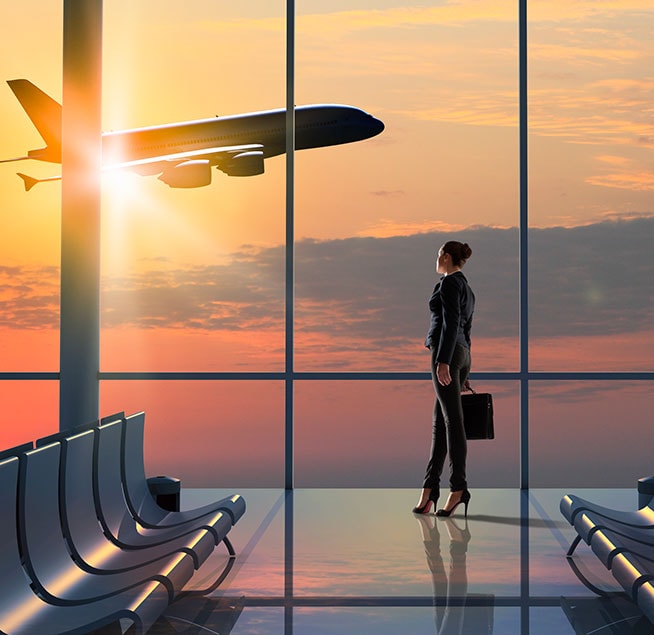Business Travel Super Simplified
Designed for businesses seeking flexibility and a wide range of choices



Planning a business trip? Understanding your travel allowance can make a world of difference. Dive into our blog to uncover what business travel allowance means, what costs it covers, and the best practices for managing your expenses:
When employees embark on business trips, they incur various expenses, such as hotels, cab rentals, and meals. Their organisation typically covers expenses directly related to their business activities, while unrelated costs are not reimbursable. It's crucial for employees to understand which expenses are covered and the limits set by their company to ensure responsible spending.
In this article, we explain what a business travel allowance is, what it covers, and how to manage business travel expenses effectively.
| Add savings & convenience to your corporate travel! |
Business travel allowance is a sum of money that covers the expenses incurred on business-related travel. The amount can however vary based on the following factors:
The allowance is designed to cover common expenses during business travel so that employees do not have to spend out-of-pocket. It helps in maintaining the employees’ morale and enables them to focus on fulfilling the objectives of their business trip.
Typically, business travel allowance covers the following work-related expenses:
This includes the cost of travelling to the business destination and back. It includes:
If employees are using their personal vehicle, the company will cover the cost of fuel, based on mileage.
The employees' hotel stays come under business travel allowance. Other types of lodging, such as resorts and short-term rental apartments may also be covered. The sum will generally vary based on the duration of stay, the employee's designation and the type of trip.
Subsistence expenses cover meals and drinks during the trip. They're often calculated as a per day allowance, based on the standard rates of the particular geographical location.
Incidental expenses are the small costs incurred during a business trip. They include tips, service charges, and other small purchases. Companies may fix a per diem on incidentals or reimburse employees after they return from the trip.
Business travel insurance is essential as it covers unexpected incidents and accidents such as:
and other unforeseen costs during a business trip. Some companies may include the cost of purchasing trip insurance in the business travel allowance.
Costs that don't fall under incidentals but are incurred and necessary are miscellaneous expenses. They include laundry services for extended stays, internet and phone charges for business communications and fees related to business activities like a business centre usage or event registration fees.
| Unlock efficiency and savings for your business travel today! |
Travel allowance policies typically do not cover the following types of expenses:
Companies do not reimburse the money employees spend on things that aren't related to work and are categorised as personal expenses. Such expenses include personal shopping, gifts for family and friends, and leisure activities such as movies, sightseeing and tours not related to business.
If employees' family members or friends accompany them on their business trips, the costs incurred on them aren't covered by the company travel policy. The costs of the family members’ airfare, hotel stay and transportation must be borne by employees.
Any extra charges that employees may incur whilst using luxury services like spa treatments are not reimbursed. Similarly, any unnecessary upgrades in accommodation that are beyond the corporate policy are not covered.
Calculating business travel allowance depends on multiple factors and can be complex. Here are some steps to help determine how much to allocate to travel expenses.
The nature, duration and destination of the business trip are factors to consider. For example, the allowance for domestic travel will be different compared to international travel.
Direct costs include airfare, accommodation, meals and transportation. Indirect costs cover travel insurance, baggage fees, event registration and other costs necessary for the successful completion of the trip.
A business travel policy outlines specific expense categories and their respective limits, often with tiers based on an employee's designation. This structured approach simplifies managing business expenses and allocating travel allowances, ensuring a more streamlined and efficient process.
When it comes to covering business travel allowance, there are different approaches:
You can set a daily rate to cover meals and incidental expenses. Employees can claim per diems through the corporate credit card. A per diem allowance simplifies accounts as receipts are not always needed. It also gives employees flexibility around their daily budget. However, setting a fair per diem for different locations and different costs can be challenging.
Employees can pay out-of-pocket for business expenses and submit expense reports with receipts for reimbursement after their trip. This approach ensures that funds are used strictly for allowable expenses, promoting responsible spending. However, it can also increase the administrative burden for both employees and the organisation.
Providing employees with a lump sum before the trip can streamline expense estimation. However, managing receipts and ensuring accurate reimbursement can become challenging.
Business travel allowances will work smoothly if you ensure their efficient management and strict compliance. Here are some tips to consider:
In conclusion, understanding and effectively managing business travel allowance is crucial for both employers and employees. This predetermined sum covers essential expenses like transportation, accommodation, and meals, while excluding personal costs. Whether through a per diem system or post-trip reimbursement, a clear travel policy and robust expense management software play pivotal roles in ensuring compliance and facilitating seamless reimbursements. By implementing these practices, businesses can optimize their travel expenditure and enhance overall operational efficiency.
| Follow us on LinkedIn for business travel insights! |
Ans. In India, per diem allowance is tax-free to the extent of the expenses incurred. If the employee can prove that the entire allowance amount, including travel allowance, was spent on the business trip, then the full amount will be exempted. Else, the balance will be taxed per Indian laws.
Ans. Depends on company policy. Often, any unused portion of the business travel allowance must be returned. Some companies may allow employees to keep a small amount for miscellaneous expenses.
Ans. In such a case, companies may allow for adjustments. But employees must provide a justification for the excess cost and provide all relevant receipts.
Ans. Under the per diem method, receipts are not generally required. In other methods, employees must maintain original receipts (physical or online) and other documentation as needed while claiming travel allowance.
Related Blogs:
Our features and benefits are curated to suit the needs of every employee using myBiz.
Who manages company's travel expense
Simplified Admin Panel to manage all employees and their expenses
Detailed reports on regular basis to keep a track on your spends
Dedicated Support Manager from myBiz to take care of your queries
Who books for employees
Book using the traveller's Policy to ensure the right options are booked
Shortlist & share travel options to employees directly from myBiz
Track your requests & get the job done from one single place
Who travel for business
Special Corporate Fares in flights to ensure you get more benefits at reduced price
myBiz Assured Hotels for top-rated stay options
Sanitized Cabs to safely pick & drop you to your destinations
Grab all the corporate benefits by creating your account now
Get started by providing minimal details like employee size, organisation name, etc.
Gain most of the benefits by setting up employee-friendly policies (only Admin users).
Invite your employees to myBiz so that they could enjoy all the corporate benefits.
myBiz powers many of the small, medium & large size organisations to help them save on their travel budget and achieve more from their business travels. Read interesting stories from these organisations.